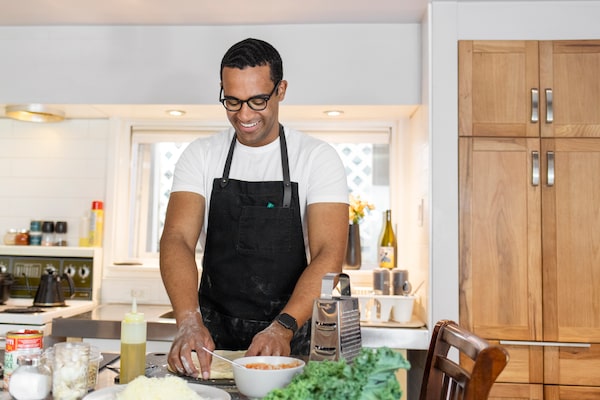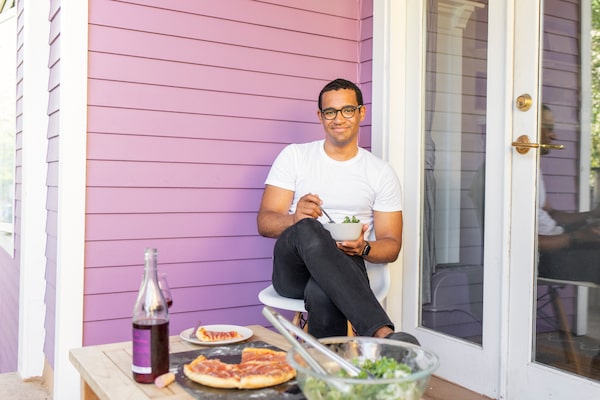
Will Shelling creates a cast iron pizza from scratch in his kitchen in Vancouver’s Kitsilano neighbourhood, on June 20, 2021.Alia Youssef/The Globe and Mail
In the before times, Will Shelling used to love going to restaurants.
“[They] have always been an experience I very much enjoy, would save up for, and try my best to go to so I could try new things.”
Cooking? Not so much. At least, not pre-pandemic.
“My approach to cooking before the lockdown in Vancouver – which honestly wasn’t really a lockdown – was more [about] sustenance,” says Mr. Shelling, an equity and inclusion strategist at Bakau Consulting in Vancouver.
“It was a really simple dish thrown together, or one of those stereotypical ‘sheet pan’ dinners you find online as a quick option after a busy workday.”
Last March, with the start of what would turn out to be months of stay-at-home orders, he found himself with significantly more time on his hands, and the inspiration to try creating delicious meals himself. The tiny kitchen in his studio apartment became a refuge, and what started as a way to fill time soon became something more meaningful. Cast iron pizzas, for example, weren’t just delicious, they were a reminder of his family’s weekly pizza nights when he was growing up.
“[Making pizza] brings back memories for me and makes it a situation where I feel connected to my family, despite not hugging my mom in months.”
Then, after the killing of George Floyd by Minneapolis Police officer Derek Chauvin, cooking took on a new dimension.
“The George Floyd protests and very visceral images of violence against Black bodies meant that I was often faced with seeing people who look like me brutalized at all avenues,” Mr. Shelling says.
“Cooking became a way for me to disconnect and treat myself with a bit of kindness. It gave me a means to rest. One of my colleagues recently said to me that rest in any form is an act of resistance, and I think cooking acts like that as well.”

Will Shelling enjoying the salad and cast iron pizza he just made from scratch.Alia Youssef/The Globe and Mail
Mr. Shelling isn’t the only one who found solace in food. From Dalgona coffee to sourdough starters to banana bread, social media was overrun with cooking-related trends, a shift that was reflected in purchasing behaviour by Canadians. According to Pam Wood, home industry analyst at market research company The NPD Group, sales of small kitchen appliances increased by 40 per cent in the first 13 weeks of the pandemic, particularly specialty items such as coffee and espresso makers (up 45 per cent), electric grills and griddles (up 43 per cent) and waffle irons and sandwich makers (up 63 per cent).
Canadians are still spending on small appliances and housewares, more than a year into the pandemic, Ms. Wood says. In the 13-week period ending March 20, 2021, “sales of small kitchen appliances were still growing [by more than 31 per cent] – just slightly slower than during the first wave [of COVID-19], which indicates that Canadians continue to invest in cooking at home.”
Meal kits have also jumped in popularity. In 2019, just 14 per cent of Canadians had used a meal-kit company. In 2020, that number spiked to 22 per cent – and according to The NPD Group’s restaurant industry analyst Vince Sgabellone, half of them intend to continue purchasing these kits even after the pandemic ends. That’s good news for the restaurants and grocery stores that have also offered this service.
But not everyone has found pandemic cooking joyful.
“Pre-pandemic, and even at the beginning of the pandemic, I was like, ‘Oh my god, I have so much time to cook this amazing meal, I’m so excited,’ " says Remy Delima, a senior account manager at a Toronto public relations firm. “But then when you do that three times a day, every day, you’re like, ‘Oh, god. I’m over this. I’m over the dishes!’ ”
Ms. Delima’s family has always cooked a lot, especially dishes from her father’s homeland of Portugal. But it didn’t really become a hobby until she became vegetarian in her 20s and started looking for creative ways to cook with different plants, and to make healthy meals that weren’t also boring. Now it’s harder to depend on restaurants for inspiration, not to mention a break from the kitchen. Cooking has become a slog.
“I went from loving cooking to now just throwing things in a bowl and calling it a day,” she says. “It’s just not as inspiring a time.”
Still, Ms. Delima doesn’t think this phase will last forever. She’s eager for the return of in-person dining at restaurants, something she thinks will help spark her creativity. And she’s not the only one. According to The NPD Group’s consumer research, most Canadians are looking forward to eating at restaurants again, though the industry has been permanently changed by the pandemic.
More than 3,000 independent restaurants closed in 2020. Still, those that survived are poised for recovery, Mr. Sgabellone says, especially in the realm of off-premises dining.
“The biggest trend in food service brought about by the pandemic has been digital ordering and digital engagement. Mobile apps, digital menus, touchless pickup … all accelerated during the pandemic, and they will prevail long afterwards.”
Does that mean our collective hyper-focus on cooking will be relegated to just another pandemic trend? Not necessarily, Ms. Wood says.
“Once Canadians return to offices and children return to schools and activities, convenience will be critical once again,” she says. “Consumers will invest in convenience, regardless of whether that is with meals sourced away from home, or innovation in appliances to support making quick and convenient meals in home. Multi-cookers and air fryers are great examples of appliance products that support consumers’ need for fast and easy meals, and both of those products have enjoyed strong growth in the past as a result.”
For his part, Mr. Shelling says he will definitely continue cooking.
“As COVID restrictions have loosened and tightened back up, I’ve started cooking for my friends more. [It’s] an incredible act of service to be able to say to someone, ‘Hey, I know you like this flavour, I made you this and I hope you enjoy it.’
“That act of community care, and just honestly supporting the people around you, is something I plan on continuing after the pandemic. Dinner parties are something I’ve been dreaming of, and you’ll find me in the kitchen.”